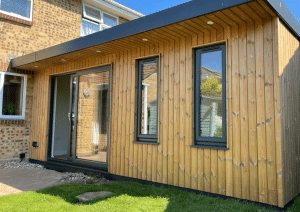Updated April 2024
When is an Annexe a Separate Dwelling?
In this blog, we will help you to understand when an annexe becomes a separate dwelling in the UK.
Are you thinking about adding an annexe to your property? Perhaps a granny annexe for extended family, or a dedicated workspace? While annexes offer exciting possibilities, understanding the legal distinction between an annexe and a separate dwelling is crucial.

Unveiling the Grey Area – When is an annexe a separate dwelling?
In the UK, the line between an annexe and a separate dwelling can blur. Typically, an annexe is considered ancillary to the main house, meaning it provides additional living space. Whilst it can have facilities which means it could be entirely self-contained, this is not the case as an annexe must have a strong functional link to the main dwelling, to get planning permission.
As such it provides additional living space for elderly parents or relatives who wish to have the independence of their own home. Whilst still having the comfort of knowing that their family are close to hand should they need them.
Key Factors to Consider
Here’s where things get a little intricate:
• Facilities: Does the annexe have its own bedroom, bathroom, and kitchen? These are essential for independent living.
• Access: So while some annexes might have separate pedestrian entrances, others might connect internally.
• Shared Amenities: Does the annexe rely on the main house for utilities like water or heating?
Navigating the Legal Landscape
If your annexe boasts full amenities and a separate pedestrian entrance, the Council might consider it a separate dwelling.
Things to note when it comes to annexes:
• Planning permission: Altering an existing structure may necessitate formal planning approval. Building a new structure definitely will.
• Council Tax: Separate dwellings often incur higher council tax bands, annexes can claim a reduction in some circumstances (this is always worth checking with your local council).
• Building Regulations: Specific building regulations might apply to ensure the annexe meets safety and quality standards.
Seeking Expert Guidance
Determining the legal status of your annexe and navigating the planning process can be a complex endeavour. This is where consulting a professional planning consultancy becomes invaluable.
Here’s where we come in
Our team of specialists possess the expertise to meticulously assess your project and provide:
- Clear explanations regarding the legal classification of your annexe.
- Expert advice on the feasibility of your project.
- Assistance in navigating the planning application process.
Don’t embark on this journey alone. Contact us to discuss your project and ensure your annexe vision aligns with legal planning requirements.
Contact us
Get in touch using our book-a-call form, or email us below.
Further reading
A Government webpage concludes: The annexe shall be used ancillary to the dwelling approved under application and shall at no time be sold or let as a separate dwelling.
We have a whole section of our website dedicated to annexes, and planning permission, here are just a few.


